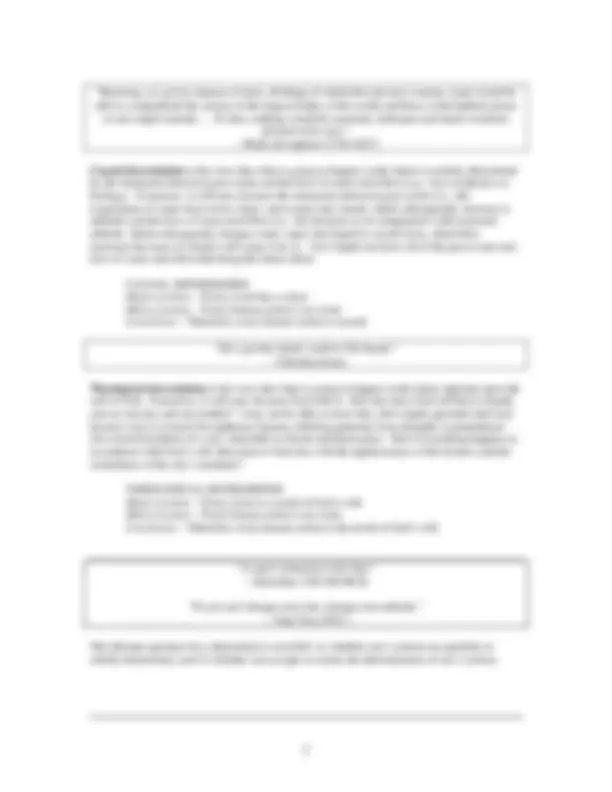



Study with the several resources on Docsity

Earn points by helping other students or get them with a premium plan


Prepare for your exams
Study with the several resources on Docsity

Earn points to download
Earn points by helping other students or get them with a premium plan
Community
Ask the community for help and clear up your study doubts
Discover the best universities in your country according to Docsity users
Free resources
Download our free guides on studying techniques, anxiety management strategies, and thesis advice from Docsity tutors
The philosophical debate between free will and determinism through the lens of three types: logical, causal, and theological determinism. Students will examine quotes from philosophers and poets, as well as logical arguments, to gain a deeper understanding of the concepts and their implications. This seminar is part of the writing seminar i course in asian studies/philosophy & religion at berea college, fall 2006.
Typology: Assignments
1 / 2

This page cannot be seen from the preview
Don't miss anything!


GSTR 110-B Dr. Jeff Richey GSTR 110-E Asian Studies/Philosophy & Religion Writing Seminar I Berea College Fall 2006 Jeffrey_Richey@berea.edu
Who is in control of my life?
“I am the master of my fate: I am the captain of my soul.” -- William Earnest Henley (1849-1903)
If I answer, “No one and nothing,” then I am a believer in free will – the ability of rational agents to control their actions. Yet I can will freely without necessarily enjoying freedom of action. Tomorrow, I may will to mow the grass, but be unable to actualize my will because it will rain.
“Wherever the fates lead us, let us follow.” -- Virgil (70-19 BCE)
If I answer, “Someone or something,” then I am a believer in determinism – the inability (partially or wholly) of human agents to control their actions due to non-human forces or personalities. But the nature of these non-human forces or personalities can be defined in many different ways:
Depending on my view of determinism, I might be a compatibilist (one who holds that some kind of free will is compatible with some kind of determinism) or an incompatibilist (one who holds that no kind of free will is compatible with any kind of determinism). There are at least three types of determinism:
“ Que sera, sera / Whatever will be, will be.”
Logical determinism is the view that what is going to happen in the future will indeed happen and cannot be avoided. Tomorrow, it either will or won’t rain; logically, one of these statements must be true, and the other false – one of them will occur and one of them won’t. Yet this form of determinism doesn’t hold that we can know which of these events will in fact occur; in this sense, precise future events are not yet determined – it is only the case that there will be future events.
LOGICAL DETERMINISM Major premise – Every event either will or won’t occur in the future. Minor premise – Every human action is an event. Conclusion – Therefore, every human action either will or won’t occur in the future.
“Knowing, at a given instance of time, all things of which the universe consists, [one] would be able to comprehend the actions of the largest bodies of the world and those of the lightest atoms in one single formula…. To him, nothing would be uncertain, both past and future would be present to his eyes.” -- Pierre de Laplace (1749-1827)
Causal determinism is the view that what is going to happen in the future is entirely determined by the interaction between past events and the laws of cause and effect (e.g., laws of physics or biology). Tomorrow, it will rain, because the interaction between past events (i.e., the evaporation of water from rivers, lakes, and oceans into clouds, which subsequently increase in altitude) and the laws of cause and effect (i.e., the decrease in air temperature with increased altitude, which subsequently changes water vapor into liquid or crystal form, which then increases the mass of clouds) will cause it do so. Yet I might not know all of the past events and laws of cause and effect that bring the future about.
CAUSAL DETERMINISM Major premise – Every event has a cause. Minor premise – Every human action is an event. Conclusion – Therefore, every human action is caused.
“He’s got the whole world in His hands.” -- Christian hymn
Theological determinism is the view that what is going to happen in the future depends upon the will of God. Tomorrow, it will rain, because God wills it. But why does God will that it should rain on one day and not another? I may not be able to know this, but I might speculate that God bestows rain as reward (for righteous farmers suffering patiently from drought) or punishment (for wicked residents of a city vulnerable to floods and hurricanes). But if everything happens in accordance with God’s will, then doesn’t God also will the righteousness of the farmers and the wickedness of the city’s residents?
THEOLOGICAL DETERMINISM Major premise – Every event is a result of God’s will. Minor premise – Every human action is an event. Conclusion – Therefore, every human action is the result of God’s will.
“A man’s character is his fate.” -- Heraclitus (540-480 BCE)
“If you can't change your fate, change your attitude.”
The ultimate question for a determinist is twofold: (1) whether one’s actions are partially or wholly determined, and (2) whether one accepts or resists the determination of one’s actions.